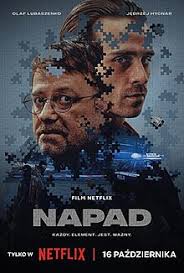
JUSTICE/ NAPAD
Poland, 2024, 113 minutes, Colour.
Olaf Lubaszenko, Jedrzej Hycnar, Wiktoria Gorodecka.
Directed by Michal Gazda.
Napad/Justice is a Polish police investigation film – but, with a difference.
While there are plenty of crime and investigation films from Poland, this one has a particular difference in the personality of the investigator. In fact, he is investigator from the past, from the Communist pass, using the strong-arm tactics and techniques of the period. He is now called in to investigate a contemporary crime.
He is partnered with a young woman, contemporary Poland, able to learn from him as well as to report on him to her supervisors.
While the crime and investigation are interesting in themselves, the important perspective is the personality of the old investigator, his having to adapt to methods of the present, pensionable with his reliance on the harsh methods of the past, challenged as to whether they are appropriate in the present.
Enjoyable for audiences who do like crime investigations – and those investigations with some differences.
- The title? Crime? Investigation? Modes of investigation? Human rights? Justice?
- Setting, the Polish city, the crime, the bank and the interiors, homes and apartments, farms, workplaces, the police precinct and offices, hotels and lodgings? Atmosphere? The musical score?
- The structure of the film and its effect: the robbery and killings, the commissioning of the investigator, the 14 days, signalling of the days, the flashbacks and elaboration of the action? The cumulative effect? Following the steps of the investigation, and the visualising continually of the action of the past?
- The crime, the bank, the masked men, the robbery, the tellers and the return, terrorised, identifying, the murders? The security man, the confrontation, his death and dragging his body?
- The authorities, the background situation of banks emerges, reputations? The minister, his precarious position, his Commissioner, approaching the retired official, Gadacz? The authorities using him? His former position, in the Communist regime, the 1970s and 1980s, his reputation, surveillance, violent tactics? Yet his skill? Giving him 14 days?
- Gadacz and his personality, consciousness of his past, the background story of his family, work and the death of his mother, wife separation, not seeing his family? Memories of the past, the link with the Minister? His statement that he could see behind people’s masks? His method of investigation, shrewd, testing the hunches, confrontations, violence, planting photos and letters, gauging reactions?
- Ola, her background, her skills in work, partnering Gadacz, to report on him? Her observing his methods, sharing in the work, in the office, in the field, observing, in Gadacz up in her house, their discussions, her final confession, her receiving the award, and the final discussion with Gadacz?
- Suspicions of the killers, the security guards, swapping timetables, the military swearing-in ceremony, alibis, Kacper as leader, the other two men, friends from the past, influence over the others? The participation, the gradual revelation, the flashbacks and seeing them in action? Bartek, quiet, with his mother, the aftermath, in the video store, Gadacz paying the boy to give him the photos, his collapse, in the bank, hospital, at home, phoning the authorities, to come in and confess, upset on the tram, confronted by Kacper, their talk, Kacper strangling him, hanging him?
- Marek, stronger, his work, his father, the final confrontation with Kacper, the knife and the rifle, the fight, his death? Kacper and the police, saying it was self defence?
- Casper, his motivations, his mother and the suicide, Gadacz visiting the grave, outside the cemetery? The sister, adoption, Kacper and his obsession? Marek taunting him about his sister and her separate life? Gadacz and his visiting the authorities, getting the information, the interrogations, his violent methods, the others observing?
- The military issue, Gadacz going to the camp, the authorities, the frightened soldier, losing his rifle, losing the rounds?
- The final interrogation, Kacper and his escape, the pursuit, his taking the taxi, – knowing where he went, confronting him with his sister, Kacper going out, the confrontation, the shooting?
- The authorities, the banks, satisfaction at the end?
- The critique of the Communist days and investigations? Get the effectiveness? The audience liking and not liking Gadacz? Identifying with all Ola? Observing the details of the investigation?